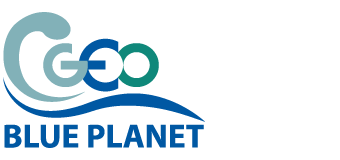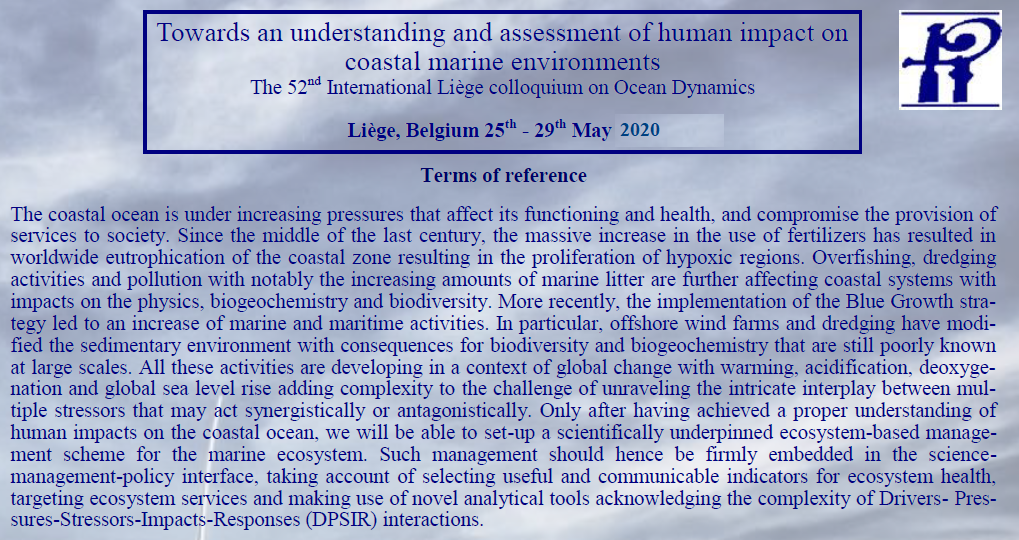The 52nd International Liege Colloquium on Ocean Dynamics
The 52nd International Liège colloquium on Ocean Dynamics
Towards an understanding and assessment of human impact on coastal marine environments
Liège, Belgium 25th – 29th May 2020
Web site: http://labos.ulg.ac.be/gher/home/colloquium/
The coastal ocean is under increasing multiple (climate and not-climate) pressures that affect its functioning and health, and compromise the provision of services to the society. The set-up of a scientifically underpinned ecosystem-based management scheme for the coastal ocean requires a thorough understanding of human impacts on the physics, biogeochemistry and biodiversity at large scale. Such a management scheme should be firmly embedded in the science-management-policy interface, taking account of selecting useful and communicable indicators for the ecosystem health, targeting ecosystem services and making use of novel analytical tools acknowledging the complexity of Drivers-Pressures-Stressors-Impacts-Responses (DPSIR) interactions.
The 52nd international Liège colloquium will gather an interdisciplinary community of scientists to overview the progress in our capabilities to understand, monitor and forecast the impact of human activities on coastal marine environments to guarantee a productive and healthy system as requested by the EU Marine Strategy Framework Directive and the UN Sustainable Development Goal 14.
Deadline for Abstract submission: January 17th 2020.
Opening KEYNOTE Speaker: Karline Soetaert (NIOZ, NE).
Regular sessions will be held on the following themes:
- Assessing the impact of sedimentary changes on the coastal ocean physics, biodiversity and biogeochemistry. KEYNOTE Speaker:Martin Solan (University of Southampton, United Kingdom)
2. Assessing the impact of hard substrate introduction on the coastal ocean physics, biodiversity and biogeochemistry. KEYNOTE Speaker: Jennifer Dannheim (AWI and HIFMB, Germany)
3. Assessing the impact of land-based pressures on the coastal environment, river-estuary-coastal ocean coupling. KEYNOTE Speaker: Marjorie A.M. Friedrichs (Virginia Institute of Marine Science, USA)
4. Multiple stressors, multi-use, cumulative effect assessment, including climate change. KEYNOTE Speaker: Philip Boyd (University of Tasmania, Australia)
5. Ecosystem services. KEYNOTE Speaker: Tara Hooper (Plymouth Marine Laboratory, United Kingdom)
6. Indicators definition for ocean health assessment in connection with SDG30 and GES assessment. KEYNOTE Speaker: Ángel Borja (AZTI, Spain)
7. Science base for marine spatial planning. KEYNOTE Speaker: Vanessa Stelzenmüller (Thünen Institute, Germany)
SIDE EVENT: A special event gathering scientists, stakeholders and industries is foreseen on Tuesday May 26th afternoon for reviewing current knowledge and gaps on offshore wind farms impacts on biodiversity and biogeochemistry. The special event will set the scene for a follow-up discussion during a networking reception directly following the presentation.
Further details (scientific committee, submission, registration, deadlines, venue…) are available on the web site (http://labos.ulg.ac.be/gher/home/colloquium/).

